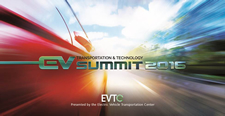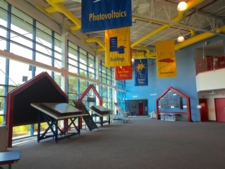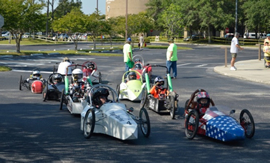| Volume 2, Issue 3 - Summer 2016 | ||||||||
EVTC Spotlight
General Interest
Meetings & ConferencesJuly 20-21, 2016 | EV Roadmap 9 | Portland, OR September 13-15, 2016 | Electric & Hybrid Vehicle Technology Expo | Novi, MI October 2-7, 2016 | Electrochemical Society, Prime 2016 | Honolulu, HI October 17-20, 2016 | EV Summit | Cocoa, FL January 8-12, 2017 | TRB 96th Annual Meeting | Washington, D.C.
EVTC's 2016 EV Transportation & Technology Summit
The Electric Vehicle Transportation Center will host over three days of meetings with key EV stakeholders at the Florida Solar Energy Center, October 17-20, 2016. The EV Transportation and Technology Summit focuses on transportation planning and infrastructure requirements needed to support the adoption of many forms of electric vehicles. The Summit provides an update on the current state of EV deployment, technology and planning.
Last year's Summit speaker list represented a broad cross-section of those involved in the deployment of electric vehicles and included, Ashley Horvat (PlugShare), Kristine Williams (Center for Urban Transportation Research) and Christian Ruoff (Charged Magazine).
Sponsorships, that include Summit registration and display space in FSEC's Visitors Center are available on the Summit website at http://www.evsummit.org/Sponsor.php.
|
Electric vehicles are three times more efficient than internal conventional vehicles due to the use of lighter weight advanced lithium ion batteries and highly efficient electric motors. The 2016 Electric Vehicle Technology Workshop is designed to cover the basics of electric vehicle technologies while taking a closer technical look at three important aspects: batteries, electric powertrains, and vehicle to grid (V2G) technologies. Workshop attendees will learn about state-of-the-art battery technologies and how they are applied in electric vehicles. They will be introduced to the chemistry of various battery technologies, primarily lithium-ion batteries, with an emphasis on their performance and degradation modes. Attendees will also learn about the various configurations of electric vehicles (EV, PHEV, EREV), vehicle energy management systems, and how these configurations may be leveraged to meet energy needs beyond transportation. The impact of EV charging on building power levels, as well as integration of EVs with building and grid (V2B, V2G) will be explored. A case study of a five-year EV ownership will also be presented.
This year's workshop is targeted toward audiences that include science and engineering students, EV enthusiasts, building energy managers, and fleet operators. The workshop will be held on Monday, October 17th, visit the Summit website for the schedule and to register, http://www.evsummit.org/.
EVTC Researchers Speak at Advanced Battery and iTech Conferences
In addition to being the chair of the Advanced Materials, Components & Systems sessions at the 16th Annual Advanced Automotive Battery Conference, Dr. James Fenton, FSEC Director, presented the session, “Battery and Fuel Cell EVs, PV and Your Home.” Dr. Fenton noted that there are over 20 models of electric vehicles that can operate at a gasoline cost equivalent of $0.99 a gallon. He provided the concepts that allow the transportation and grid infrastructures to work together, so that PV, EVs and energy efficient buildings can significantly decrease our dependency on fossil fuels and mitigate climate change.
Katherine McKenzie, EVTC Program Manager, Hawaii Natural Energy Institute at the University of Hawaii and Richard Raustad, Program Director for EVTC organized the panel and presented “Electrified Transportation as a Power Grid Resource” at the June IEEE iTEC 2016 conference in Michigan. The panel discussed the opportunities EVs provide to help transform the nation’s power network into an efficient, integrated “smart” grid and to help add distributed energy sources as an easily adoptable power option. Applications and impacts of powering EVs in conjunction with distributed solar and wind power generation were addressed, along with demand control, energy storage, the role of EVs in back-up power, and managing load at the building level. The utility’s and manufacturer’s perspectives were also shared, along with a case study on Hawaii in 2045, the first state in the nation where 100% renewable power generation is required by law.
EVTC Takes STEM Learning to the Track at Annual EnergyWhiz
|
There was no roar of engines and no smelly fumes as the electric go-carts sped by the attentive crowd of students, teachers and the public gathered by the track in front of the Florida Solar Energy Center (FSEC) in Cocoa. The final race of the Electrathon season, coordinated with Electrathon of Tampa Bay, was held in conjunction with FSEC’s annual statewide EnergyWhiz event on May 14th. EnergyWhiz provides the opportunity to learn about many clean energy technologies, including hydrogen, photovoltaics and electric vehicles. The Electrathon is a race featuring battery-powered electric go-carts that have been designed and built by individuals and teams; the challenge is completing the most laps in one hour without completely draining the vehicle's battery. EVTC provided support to the UCF team by procuring vehicle parts, providing work space and identifying technical experts. EVTC also helped the Seminole State College team get started. “Without EVTC, these teams would not have had this immersive STEM learning experience,” said Susan Schleith, who first challenged the two teams to build vehicles. Thirteen race teams participated in the event and over 1,000 people attended EnergyWhiz. The full story and race results can be found at http://www.fsec.ucf.edu/go/evtc_electrathon.
Electric Vehicle & Roadway Research Facility and Test Track
The electric vehicle test track at Utah State University in Logan Utah provides a glimpse into the future of advanced, electric automotive transportation. Electric vehicles can charge wirelessly while they are in motion through the use of inductive power transfer pads that are embedded in the roadway. Dynamic wireless charging dramatically reduces the size and weight of EV battery packs and the need for fixed location EV charging stations. Dr. Regan Zane, founder and director of the Center for Sustainable Electrified Transportation (SELECT), conceived the idea for the test track and directs research efforts at Utah State. More information is available at http://power.usu.edu/.
Wireless charging test track and research facility at Utah State University. |
EVTC Research Report Update
EVTC researchers continuously publish their results of their investigations, which can be found on our website. Currently, there are over 50 publications that can provide valuable and interesting information on everything from EV life-cycle assessments to the role of EVs in Smart Grid applications. The individual research project's webpage highlights the project's objectives, provides a brief description, and outlines the research results, impacts and benefits. Below is list of publications added during the first half of 2016. A list of all EVTC publications can be found at: http://evtc.fsec.ucf.edu/publications/.
January 2016, Sustainable Production and Consumption: Application of the TOPSIS and intuitionistic fuzzy set approaches for ranking the life cycle sustainability performance of alternative vehicle technologies
January 2016, Energy: Development of an agent-based model for regional market penetration projections of electric vehicles in the United States
January 2016, International Journal of Life Cycle Assessment: Integration of System Dynamics Approach towards Deepening and Broadening the Life Cycle Sustainability Assessment Framework: A Case for Electric Vehicles
January 2016, Applied Energy: Light-duty electric vehicles to improve the integrity of the electricity grid through vehicle-to-grid technology: Analysis of regional net revenue and emissions savings
February 2016, Applied Energy: Vehicle to Grid regulation services of electric delivery trucks: Economic and environmental benefit analysis
March 2016, EVTC: Automated, Autonomous and Connected Vehicle Technology Assessment
March 2016, Energies: On the Front Lines of a Sustainable Transportation Fleet: Applications of Vehicle-to-Grid Technology for Transit and School Buses
March 2016, Presentation: Electric Vehicle Fleet Implications and Analysis
General Interest
May 2016 Battery Electric Car Sales
Source: HybridCars.com
|
SAE Issues Guidelines for Wireless Charging Standard
“Wireless power transfer using SAE TIR J2954 is a game changer for PH/EVs,” said Jesse Schneider, Chair of SAE’s Wireless Power Transfer Committee. “This will enable consumers to simply park their vehicles into spaces equipped with TIR J2954 equipment and walk away without doing anything to charge their PH/EV.”
Source: Charged Electric Vehicles Magazine
Proterra Electric Bus Averages 325 Miles per Day in Seattle Trial
Battery bus manufacturer Proterra has released the results of a 106-day trial of a 40-foot Catalyst FC (fast-charge) bus with King County Metro in Seattle. The vehicle ran 24 hours per day to simulate one year and, with 14,500 pounds of water ballast representing 125% of a normal full load of 77 passengers, logged 32,545 total miles. Source: Fleets and Fuels
NREL Study on Consumer Views on EVs
The January 2016 report covered a 1,015 household sample designed to be representative of the United States population. Source: National Renewable Energy Laboratory
|
Useful Links
Electric Vehicle Transportation Center
EVTC's website includes a complete listing of all EVTC information, research projects, reports and staff.
FAST Act
U. S. Department of Transportation site for information on the 2015 transportation bill.
Alternative Fuels Data Center
Visit the U.S. Department of Energy's Alternative Fuels Data Center site for electric vehicles. The site contains information on the different types of electric vehicles, the benefits and considerations of owning an EV, a recharging station locator, information on incentives and legislation, and much more.
University Transportation Centers
This site provides information about the University Transportation Centers, including a listing of UTC centers, publications and external links related to transportation education and training sites.
Transportation Research Board
The Transportation Research Board's Research in Progress (RiP) website contains more than 13,000 current or recently completed transportation research projects. http://rip.trb.org/
TRID is an integrated database that provides access to more than one million records of transportation research worldwide. http://trid.trb.org/
See the schedule of conferences and webinars hosted by the Transportation Research Board (TRB) at: http://www.trb.org/Calendar/Calendar.aspx
American National Standards Institute (ANSI)
ANSI serves as a coordinator for the development of EVSE and PEV standards by the Society of Automotive Engineers (SAE), the National Highway Traffic Safety Administration (NHTSA) and many others. Their November 2014 Progress Report, "The Standardization Roadmap for Electric Vehicles" is an excellent source of information on standards development for electric vehicles and the associated infrastructure.
Idaho National Labs (INL)
Advanced Vehicle Testing (AVTA). Visit this site for extensive EV related data, research and development programs.
National Renewable Energy Laboratory (NREL)
NREL conducts transportation research, development, and deployment (RD&D) to accelerate the widespread adoption of high-performance, low-emission, energy-efficient passenger and freight vehicles.








